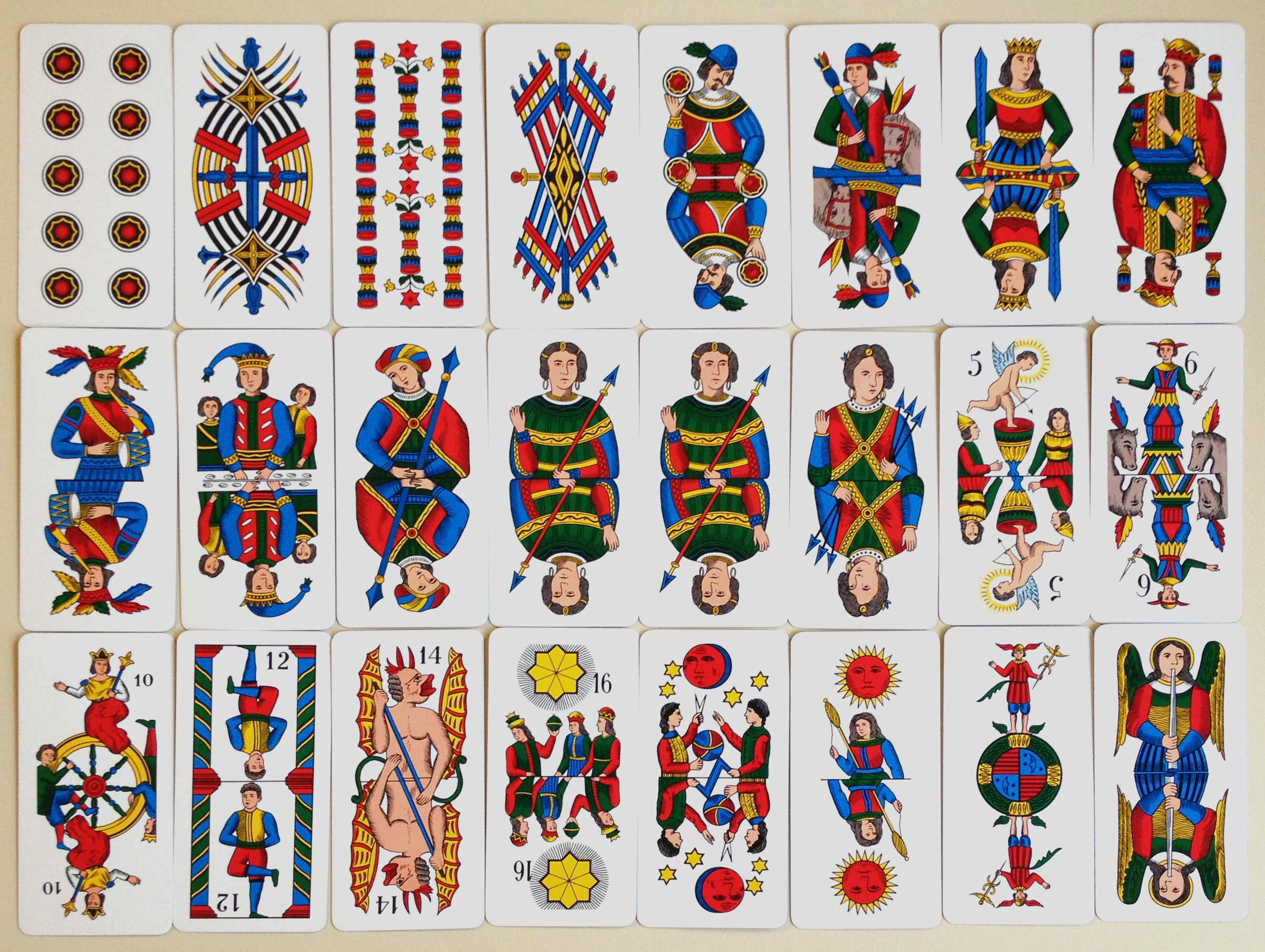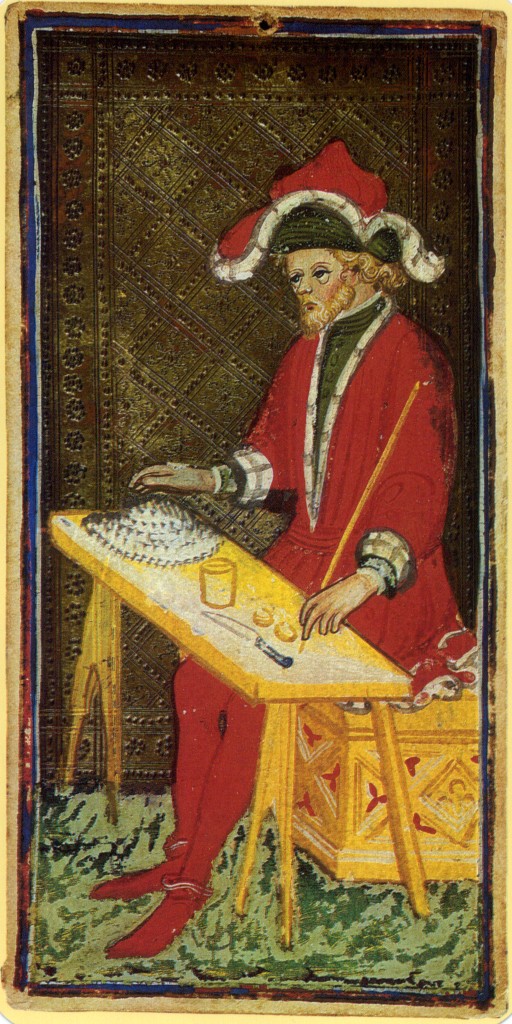|
Tarock , name for German Tarok in Württemberg
{{dab ...
Tarock is German for Tarot and may refer to: * German Tarok, progenitor of a family of American and Austro-German card games * Bavarian Tarock, once popular Bavarian card game * Königrufen, most popular Austrian tarot game, often just called Tarock * Tarock (card games), generic name for Austrian and German tarot card games * Württemberg Tarock Tapp (Swabian: Dapp or Dappen) is a trick-taking, card game for 3 or 4 players using 36 French-suited cards that is played in the south German region of Swabia, especially in the former Kingdom of Württemberg. It is the French-suited offshoot of ... [...More Info...] [...Related Items...] OR: [Wikipedia] [Google] [Baidu] |
Königrufen
Königrufen or Königsrufen (German: "Calling the King"Dummett (1980), ''Twelve Tarot Games'', p. 147.) is a four-player, trick-taking card game of the Tarot card games, tarot family, played in Austria and Southern Tyrol, with a pack of 54 cards and variants for two, three and six players. As with other regional tarot card games, it is usually called Tarock (the German term for tarot card games) by its players. It is the only variant of Tarock that is played over most of Austria and, in 2001, was the most popular card game in Austria after Schnapsen and Rommé. By 2015, it had become "the favourite card game of Austrians". It has been described as the most interesting tarot game for four players, the "Game of Kings", a game that requires intelligence and, with 22 trumps in play, as good "training for the brain". In comparison with other card games, Königrufen may be played with a wide range of possible contracts. The name of the game comes from the practice in the most basic cont ... [...More Info...] [...Related Items...] OR: [Wikipedia] [Google] [Baidu] |
Bavarian Tarock
Bavarian Tarock () or, often, just Tarock, is a card game that was once popular in Bavaria and also played in parts of Austria as well as Berlin. The name is a clue to its origin in the historical German game of ross-arock, a game using traditional Tarot cards. At some point in the mid- to late-18th century, attempts were made to emulate Tarock using a standard 36-card German-suited pack, resulting in the formerly popular, south German game of German Tarok. During the last century, the variant played with a pot (''Haferl'') and often known as Bavarian Tarock or Haferltarock, evolved into "quite a fine game" that, however, has less in common with its Tarock progenitor. German Tarok also generated the very similar game of Tapp, played in Württemberg, and both are related to Bauerntarock, Dobbm and the American games of frog and six-bid solo. While in Bavaria "Tarock" without additions will usually mean this game, in Austria the term refers to true Tarock games, most commonly K� ... [...More Info...] [...Related Items...] OR: [Wikipedia] [Google] [Baidu] |
Tarock (card Games)
Tarot games are card games played with tarot packs designed for card play and which have a permanent trump suit alongside the usual four card suits. The games and packs which English-speakers call by the French name tarot are called tarocchi in the original Italian, Tarock in German and similar words in other languages. Tarot cards were invented in northern Italy around 1420 for the purpose of playing cards. With their appearance came the first of the two great innovations in trick-taking games since they arrived in Europe: the concept of trumps. At around the same time or slightly earlier, a similar concept arose in the game of Karnöffel. In this south German game played with an ordinary pack, some cards of the given suit had full trump powers, others were partial trumps and the 7s had a special role. These features are retained in games of the Karnöffel family to the present, but are never seen in tarot games. Suits with these variable powers are called chosen or select ... [...More Info...] [...Related Items...] OR: [Wikipedia] [Google] [Baidu] |
German Tarok
German Tarok, sometimes known as Sansprendre or simply Tarok, is an historical ace–ten card game for three players that emerged in the 18th century and is the progenitor of a family of games still played today in Europe and North America. It became very popular in Bavaria and Swabia during the 19th century before being largely superseded by Schafkopf, but has survived in the local forms of Bavarian Tarock and Tapp. During the mid-19th century, it became the most popular card game among Munich's middle classes and was also played in the late 19th and early 20th centuries by notable Bavarian author Ludwig Thoma, frequently appearing in his novels and journal articles. It was superseded after the First World War by other forms such as Bavarian Tarock. German Tarok originated in an attempt to play the Tarot game of Grosstarock with a standard 36-card German-suited pack instead of Tarot cards, but later evolved into a much more interesting game featuring bidding and a suit of pref ... [...More Info...] [...Related Items...] OR: [Wikipedia] [Google] [Baidu] |
Tarot
Tarot (, first known as ''trionfi (cards), trionfi'' and later as ''tarocchi'' or ''tarocks'') is a set of playing cards used in tarot games and in fortune-telling or divination. From at least the mid-15th century, the tarot was used to play trick-taking Tarot card games, card games such as Tarocchini. From their Italy, Italian roots, tarot games spread to most of Europe, evolving into new forms including German Grosstarok and modern examples such as French Tarot and Austrian Königrufen. Tarot is most commonly found in many countries, especially in English and Spanish speaking countries where tarot games are not as widely played, in the form of specially designed Cartomancy, cartomantic decks used primarily for tarot card reading, in which each card corresponds to an assigned archetype or interpretation for divination, fortune-telling or for other non-gaming uses. The emergence of custom decks for use in divination via tarot card reading and cartomancy began after Frenc ... [...More Info...] [...Related Items...] OR: [Wikipedia] [Google] [Baidu] |




